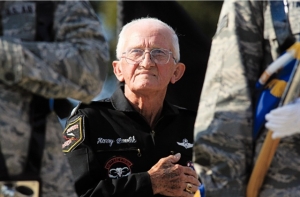At long last, he was free
By Kenneth Fine
Published in News on September 22, 2012 11:41 PM

News-Argus/MICHAEL BETTS
Retired Air Force Lt. Col. Harry Pawlik watches members of the 4th Fighter Wing Honor Guard post the colors Friday during a POW/MIA Remembrance at Seymour Johnson Air Force Base.
GREENVILLE -- Harry Pawlik closes his eyes and takes a moment to collect himself.
He knows it won't be long -- that tears will fall when he talks about the moment that marked the culmination of a lifetime of struggle, tragedy and triumph.
"I couldn't wait. I just couldn't wait. So I asked the captain, 'Can I climb up on the mast so I can see what the city looks like?' I wanted to see that Statue of Liberty," he said. "Well, he let me, and when I saw that doggone lady, God, what a sight."
Pawlik's emotions get the best of him.
He weeps.
"I saw freedom and what it meant," he said. "I thought about what this country had already done for me."
It took him back to the day he escaped from a concentration camp -- to the moment he was picked up by members of Gen. Patton's 11th Armored Division somewhere in Austria.
It placed him, again, in the Battle of the Bulge, where he fought alongside his liberators against the enemy that was responsible for breaking up his family.
And it reminded him of the American officers who treated him like one of their own -- of the man who sponsored his voyage to a new country, a new home, a new beginning.
"It was emotional," Pawlik said, wiping tears from his eyes. "It still is."
*
A 9-year-old and his family are "carted off" to a slave camp in Czechoslovakia.
"At first, they had us work on some German farms," Pawlik said. "It was a slave labor camp. I don't even remember how long I spent there."
But he remembers how he came to leave it -- how he was "herded" onto a train bound for the Western Front.
"When they took me on that train, that's when I lost my family. Never to be seen again," he said. "Somewhere along the way, the train was stopped and the SS took over. They took us to a concentration camp -- to Mauthausen."
He can see the 186 steps that lead prisoners from the base of the camp into a vast granite quarry.
"It was called the Todesstiege -- the Staircase of Death," he said, breaking down. "They had people six-abreast carrying 40- to 50-pound granite slabs up the steps to build the fence. You can imagine, with the condition the prisoners were in, what it was like."
The 82-year-old, again, starts sobbing.
Other images from inside Mauthausen still haunt him.
There were vicious beatings, men gunned down without provocation.
But his expression is far different when he talks about the Todesstiege.
Nearly 70 years later, he still can't come to terms with what he witnessed along that staircase.
"Most of the people," he said, before taking a long pause. "Most of the people were killed on those steps. They didn't even have a chance."
Pawlik, though, was one of the lucky ones.
He escaped one night and never looked back.
"I don't even know where and the heck I wound up, but I was picked up by the American Army -- Gen. Patton's 11th Armored Division," he said. "I spoke German and Polish, and lucky for me, they said, 'Do you want to come with us?'"
*
A 14-year-old from Poland becomes an impromptu member of the U.S. Army.
He is given a gun.
He engages German forces during the Battle of the Bulge.
He is wounded alongside his newfound comrades multiple times.
But Pawlik tells friends it gave him an opportunity to rise up against those who had stripped him from his family -- those who robbed him of his freedom, his innocence.
And it gave him a purpose once the war ended.
He was coming to America.
"When the war ended," he said, pausing to cry one final time. "Excuse me. When the war ended, I had no place to go."
So he read books and magazines from the United States.
He learned about American customs and food.
And when he finally applied to make the journey to his new home -- when his military connections got his name moved to the top of a 2.5 million-person list -- he was ready to start over.
"I had made up my mind," Pawlik said. "Europe was not for me. I didn't see any future there. I was coming to the United States."
*
By 1953, Pawlik had become an American citizen.
He would end up joining the Air Force -- flying more than 100 missions over Vietnam alongside men like those who had saved his life so many years before.
And he never forgot -- and reminds people to this day -- just why his love for this country has never wavered.
His story, he says, is not about a young boy's stint as a prisoner of war -- the atrocities he witnessed along the Todesstiege; the shrapnel that struck him in the head during the Battle of the Bulge.
His first taste of freedom after being held captive, and what it has done for him since his liberation, Pawlik said, it what truly defines him,
"Back then, the idea of freedom, to me, was a wonderful thing. It really was," he said. "And all these years later, it still is. Freedom is still just a beautiful thing."
